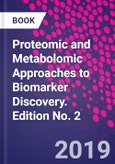Proteomic and Metabolomic Approaches to Biomarker Discovery, Second Edition covers techniques from both proteomics and metabolomics and includes all steps involved in biomarker discovery, from study design to study execution. The book describes methods and presents a standard operating procedure for sample selection, preparation and storage, as well as data analysis and modeling. This new standard effectively eliminates the differing methodologies used in studies and creates a unified approach. Readers will learn the advantages and disadvantages of the various techniques discussed, as well as potential difficulties inherent to all steps in the biomarker discovery process.
This second edition has been fully updated and revised to address recent advances in MS and NMR instrumentation, high-field NMR, proteomics and metabolomics for biomarker validation, clinical assays of biomarkers and clinical MS and NMR, identifying microRNAs and autoantibodies as biomarkers, MRM-MS assay development, top-down MS, glycosylation-based serum biomarkers, cell surface proteins in biomarker discovery, lipodomics for cancer biomarker discovery, and strategies to design studies to identify predictive biomarkers in cancer research.
Please Note: This is an On Demand product, delivery may take up to 11 working days after payment has been received.
Table of Contents
1. Biomarker discovery: Study design and execution2. Proteomic and mass spectrometry technologies for biomarker discovery
3. Tissue sample preparation for proteomic analysis
4. Sample preparation in global metabolomics of biological fluids and tissues
5. Serum and plasma collection: Preanalytical variables and standard operating procedures in biomarker research
6. Sample depletion, fractionation, and enrichment for biomarker discovery
7. Current NMR strategies for biomarker
8. Gas chromatography/mass spectrometrybased metabonomics
9. Liquid chromatographic methods combined with mass spectrometry in metabolomics
10. Capillary electrophoresis-mass spectrometry for proteomic and metabolic
11. Associating 2-DE and CPLLs for low-abundance protein discovery: A winning strategy
12. Two-dimensional difference in gel electrophoresis for biomarker discovery
13. Affinity-targeting schemes for protein biomarkers
14. Protein and metabolite identification
15. Quantitative proteomics in development of disease protein biomarkers
16. Mass spectrometry and NMR spectroscopy based quantitative metabolomics
17. Top-down mass spectrometry for protein molecular diagnostics, structure analysis, and biomarker discovery
18. Using data-independent mass spectrometry to extend detectable dynamic range without prior fractionation
19. Imaging mass spectrometry of intact biomolecules in tissue section
20. Mass spectrometry-based approach for protein biomarker verification
21. Mass spectrometry metabolomic data handling for biomarker discovery
22. Analytical methods and biomarker validation
23. Multivariate analysis for metabolomics and proteomics data
24. Cell surface protein enrichment for biomarker and drug target discovery using mass spectrometry-based proteomic
25. Advances in lipidomics for cancer biomarker discovery
26. Mass spectrometry for the identification of protein biomarkers in urinary extracellular vesicles
27. Designing clinical studies for biomarker discovery: The DESIGN criteria








